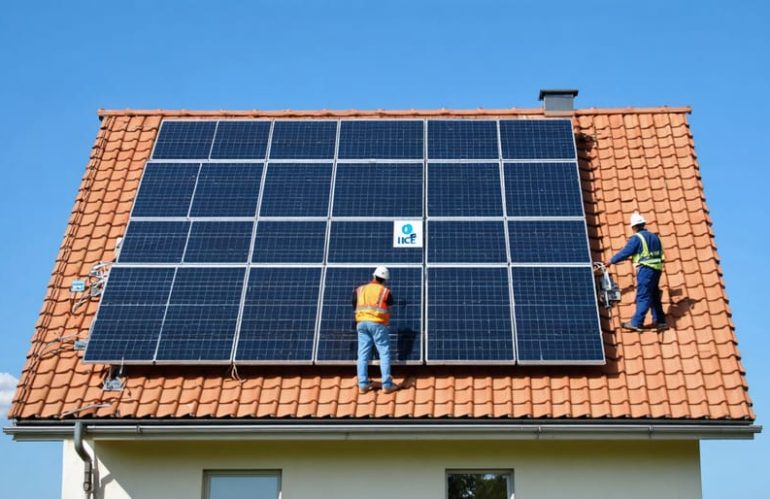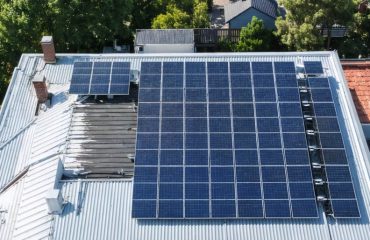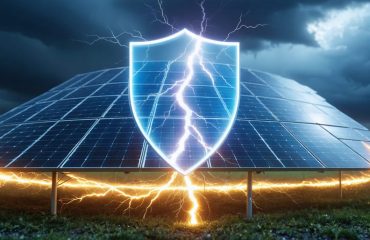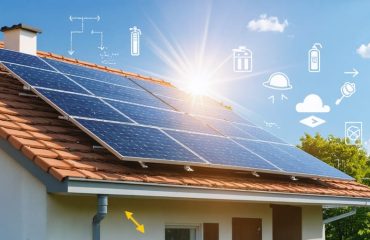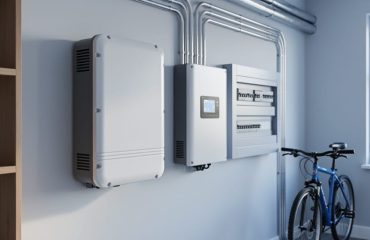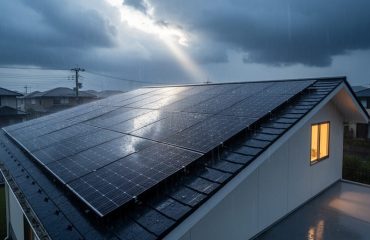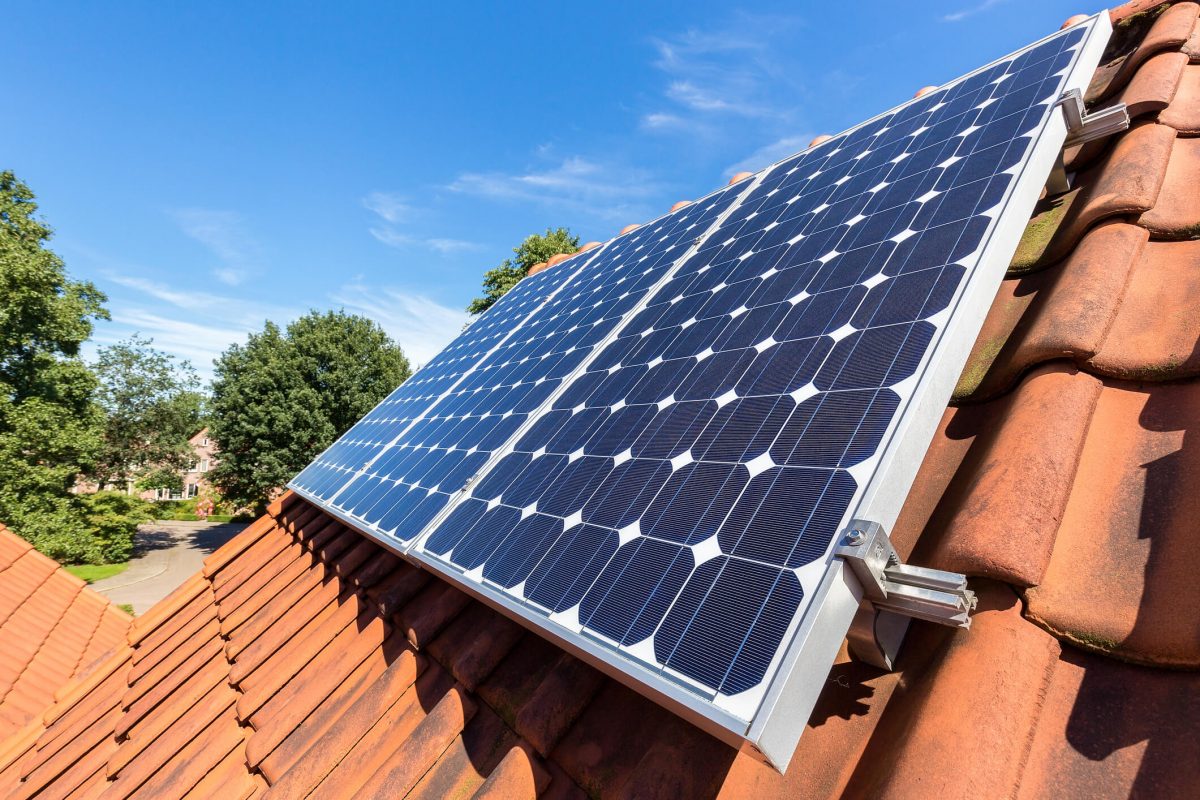Solar panel standards safeguard your home investment and ensure optimal performance of your renewable energy system. These critical regulations cover everything from manufacturing quality to installation requirements, protecting homeowners from subpar products and unsafe installations. Today’s solar panels must meet strict criteria for durability, efficiency, and safety, including resistance to extreme weather, fire safety ratings, and minimum power output guarantees.
The International Electrotechnical Commission (IEC) and Underwriters Laboratories (UL) certification marks indicate panels that have undergone rigorous testing and met established safety benchmarks. For homeowners, understanding these standards isn’t just about compliance—it’s about securing reliable performance, maintaining property value, and ensuring eligibility for tax incentives and rebates. Modern solar standards also address emerging concerns like cyber security for smart monitoring systems and end-of-life recycling requirements, reflecting the industry’s commitment to long-term sustainability and consumer protection.
Essential Safety Standards for Residential Solar Installations
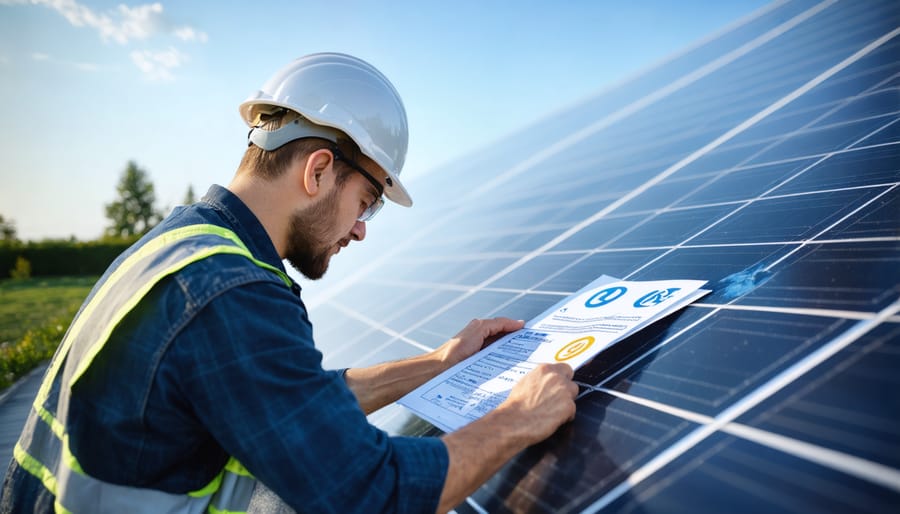
UL Certification Requirements
UL (Underwriters Laboratories) certification is a crucial safety standard for solar panels in the United States. This independent certification ensures that solar equipment meets strict safety and performance requirements through rigorous testing. When choosing solar panels, look for the UL label, which indicates compliance with these essential standards.
The main certification to look for is UL 1703, which covers flat-plate photovoltaic modules and panels. This certification tests for electrical safety, mechanical strength, and fire safety requirements. Additionally, inverters should carry UL 1741 certification, ensuring they operate safely when converting DC power to AC power for your home.
Beyond safety, UL certification offers homeowners peace of mind and practical benefits. It’s typically required for insurance coverage, local building permits, and qualifying for solar incentives. Most reputable installers exclusively use UL-certified components, as they understand the importance of protecting your investment and ensuring long-term reliability. When reviewing solar quotes, always verify that all major components carry appropriate UL certifications.
National Electrical Code (NEC) Guidelines
The National Electrical Code (NEC) provides essential safety guidelines for solar panel installations to protect your home and family. These requirements ensure your solar system operates safely and maintains its value over time. For residential installations, the NEC mandates that all solar panels must have rapid shutdown capabilities, allowing first responders to quickly de-energize the system in emergencies.
Your solar installation must include proper grounding and bonding to prevent electrical hazards. The NEC also requires appropriate labeling of all system components and disconnect points, making it easier for maintenance workers and emergency personnel to identify critical parts of your solar setup.
Wire sizing and protection are other crucial aspects covered by the code. Your solar installer must use properly rated conductors and ensure all wiring is protected from environmental damage. Additionally, the NEC specifies requirements for proper overcurrent protection to prevent electrical fires.
These guidelines are regularly updated to keep pace with evolving solar technology, ensuring your installation remains safe and efficient while meeting current safety standards.
Component-Specific Safety Requirements
Panel and Module Standards
Solar panels and modules must meet strict safety standards to protect your home and investment. In the United States, the primary certification to look for is UL 1703, which ensures panels can withstand various weather conditions and maintain electrical safety. This certification tests for fire resistance, durability against wind and snow loads, and proper electrical insulation.
Additionally, panels should comply with IEC 61215 standards, which verify their long-term reliability through extensive stress testing. These tests simulate years of outdoor exposure, including extreme temperature cycles, humidity, and mechanical stress.
For maximum safety and performance, quality solar panels must also feature proper grounding mechanisms, reliable junction boxes, and durable frame construction. Modern panels include automatic shutdown features that prevent electrical hazards during maintenance or emergencies.
When choosing solar panels, look for products that meet or exceed these standards. Reputable manufacturers will clearly display their certifications and testing results. While certified panels may cost more initially, they provide better protection for your home and typically offer superior long-term performance and reliability.
Inverter Safety Standards
Inverters play a crucial role in your solar system’s safety, converting DC power from your panels into usable AC electricity for your home. All residential solar inverters must meet UL 1741 certification, which ensures they’ll automatically shut down if the grid loses power, protecting utility workers and your equipment. Additionally, inverters need to comply with IEEE 1547 standards, which set requirements for safely connecting to the power grid.
Look for inverters with built-in ground fault protection and arc fault detection, which prevent electrical fires and shock hazards. Modern inverters also include rapid shutdown capabilities – a safety feature that quickly deactivates your solar system in emergencies. These protective measures are especially important for firefighters who may need roof access during emergencies.
To ensure maximum protection, work with certified installers who use inverters from reputable manufacturers that meet these essential safety standards. Regular maintenance checks will help keep these safety features functioning properly throughout your system’s lifetime.
Wiring and Connection Requirements
Proper wiring and connections are crucial for your solar panel system’s safety and efficiency. All electrical connections must be made with copper conductors rated for outdoor use and capable of handling the system’s maximum voltage. Wire connections should be housed in weatherproof junction boxes to protect against moisture and environmental damage.
Solar panels must be connected using manufacturer-approved connectors that match your specific panel model. Mixing different connector types is not allowed, as this can create fire hazards. The system requires proper grounding through equipment grounding conductors connected to each panel and mounting rail.
Cable management is essential – all wiring should be properly secured and protected from physical damage. Loose cables can become damaged by wind or wildlife. Conduits must be UV-resistant and appropriately sized for the number of conductors they contain. Remember that all electrical work should be performed by a certified electrician to ensure compliance with local building codes and safety standards.
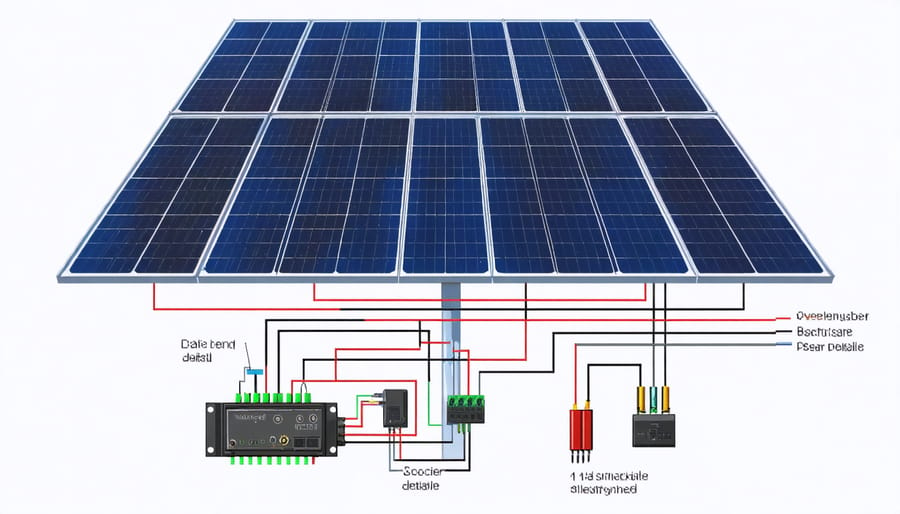
Installation and Maintenance Safety Protocols
Professional Certification Requirements
Professional solar panel installers must hold specific certifications to ensure your installation meets industry standards and safety requirements. The North American Board of Certified Energy Practitioners (NABCEP) certification is the gold standard in the solar industry. NABCEP-certified professionals have demonstrated comprehensive knowledge of solar PV systems, electrical codes, and installation safety requirements.
Most states require installers to hold an electrical contractor’s license alongside solar-specific certifications. Additionally, many manufacturers offer product-specific training programs that installers must complete to maintain warranty coverage for their installations.
Key certifications to look for include:
– NABCEP PV Installation Professional Certification
– State-specific electrical licenses
– Manufacturer-specific training credentials
– OSHA safety certifications
– Local building contractor licenses
When selecting an installer, always verify their certifications and ensure they’re current. Reputable companies will readily provide proof of their qualifications and maintain proper insurance coverage. These certifications not only protect your investment but also ensure your solar installation meets all local building codes and safety standards.
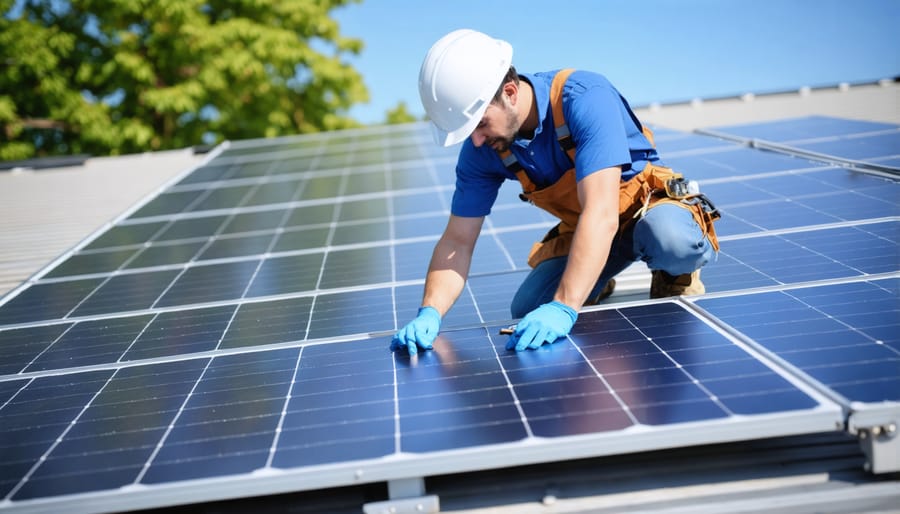
Inspection and Maintenance Standards
Regular inspection and maintenance are crucial for keeping your solar panels performing at their best while meeting safety standards. Most manufacturers recommend professional inspections at least once a year, though some areas may require more frequent checks based on local regulations.
During these inspections, certified technicians will check for loose mounting hardware, damaged wiring, and signs of water damage. They’ll also clean the panels to remove dirt, leaves, and other debris that can reduce efficiency. The inspection should include testing the system’s electrical output and verifying that all safety mechanisms are functioning properly.
Homeowners should perform monthly visual checks from the ground, looking for obvious issues like physical damage or excessive dirt buildup. After severe weather events, it’s wise to conduct additional visual inspections to ensure no damage has occurred.
Keep detailed maintenance records, including dates of professional inspections, cleaning sessions, and any repairs. Many jurisdictions require these records for compliance purposes, and they’re valuable for warranty claims and home resale value.
Most importantly, never attempt repairs yourself – always work with certified solar professionals who understand current safety standards and proper maintenance protocols.
How These Standards Protect Your Investment
Solar panel standards do more than just ensure safety – they actively protect your solar investment and add value to your property. When your solar installation meets these rigorous standards, you’re guaranteed a system that’s built to last and perform optimally for decades.
These standards ensure proper installation techniques that prevent roof damage and water leakage, protecting both your solar panels and your home’s structure. They also require high-quality materials and components that resist weathering, maintaining system efficiency over time. This means your panels will continue generating optimal power output year after year, maximizing your energy savings.
Quality standards also help maintain or increase your property value. Home buyers and appraisers recognize certified solar installations as valuable assets, often leading to higher resale values. Additionally, standardized installations make it easier to obtain insurance coverage and maintain warranty protection, providing peace of mind for your investment.
By following these standards, you’ll avoid common installation pitfalls that could lead to costly repairs or reduced system performance. They ensure your system includes proper grounding, surge protection, and safety disconnects, protecting your home’s electrical system and preventing potential fire hazards. This comprehensive protection means you can enjoy clean, reliable solar power while maintaining your home’s value and safety.
Choosing a certified solar panel installation isn’t just about following rules – it’s about protecting your investment and ensuring your home’s safety for years to come. By working with certified installers and selecting equipment that meets established standards, you’re securing both peace of mind and optimal system performance. Regular maintenance checks and compliance with safety standards will help maximize your solar investment while keeping your property protected. Remember that proper certification and standards aren’t just bureaucratic requirements – they’re your guarantee of quality, safety, and reliability in your journey toward sustainable energy. Making informed choices about solar standards today will reward you with decades of reliable, clean energy and sustained property value.

